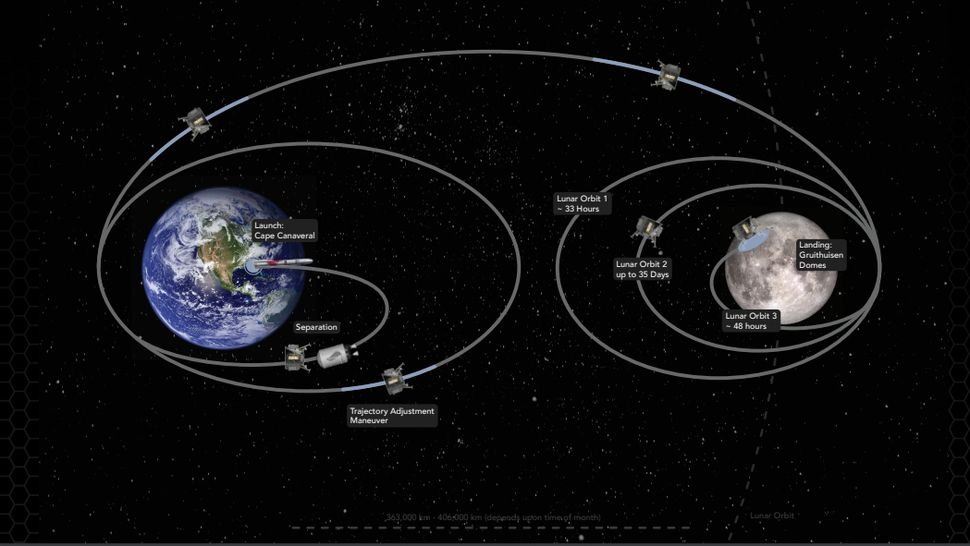
American lunar probe launched into space for first time in 50 years, but mission may fail due to fuel loss
The American lunar module Peregrine has experienced a "critical fuel loss." The first U.S. lunar landing module in over fifty years, named Peregrine, was launched into space on January 8 from the United States Space Force base at Cape Canaveral in Florida. Despite a successful launch, the mission's continued success is now in question as Astrobotic Technology, the module's developer, reported a "critical fuel loss" while specialists were attempting to address orientation issues in space.
"Unfortunately, it appears that a malfunction in the propulsion system led to a critical fuel loss. The team is working to rectify the leak, but given the situation, we prioritize maximizing the scientific data we can obtain. Currently, we are evaluating alternative mission profiles that may be feasible at this time," stated the message published by Astrobotic.
This message likely indicates that the company does not plan to attempt a landing of Peregrine on the lunar surface. Initially, the module was expected to reach its final destination by February 23.
According to available information, communication and telemetry data were successfully established with Peregrine after it was placed in orbit. However, the spacecraft later failed to orient itself towards the Sun, preventing its batteries from charging. Astrobotic attributed this to a "anomaly in the propulsion system, which, if confirmed, jeopardizes the spacecraft's ability to achieve a soft landing on the Moon."

Presumably, this occurred due to issues with the propulsion system. Astrobotic later reported that due to the anomaly, the spacecraft could not attain the required position for solar orientation, and the company's engineers are working to address this issue. According to the company, the mission controllers were able to "devise and execute an improvised maneuver to reorient the solar panels towards the Sun." After the maneuver, it was deemed successful. "The team's improvised maneuver was successful and allowed reorientation of Peregrine's solar panel toward the Sun. We are now recharging the battery," said Astrobotic in the statement.
However, the company still needs to address the propulsion system issue, as landing on the lunar surface requires the use of onboard thrusters. It remains unclear whether Astrobotic will be able to land Peregrine. According to available information, the module is designed to perform three maneuvers in orbit, but no more. If too much fuel is expended, the spacecraft may not have sufficient power for a controlled landing.
If the current mission ends in failure, it could cause significant damage to Astrobotic's business and its future plans. Additionally, the loss of Peregrine would be a setback for the United States' National Aeronautics and Space Administration (NASA) and several other institutions from multiple countries, whose payloads are on board the module. Losing Peregrine at such an early stage also means that Astrobotic will be unable to verify the module's ability to achieve a soft landing on the lunar surface.
- Related News
- Wheel of Death: new method will help astronauts stay fit in low gravity
- Due to anomalies of Orion spacecraft, lunar exploration program may be delayed for years։ NASA
- TAO Observatory: World's highest telescope to study evolution of galaxies and exoplanets
- Powerful M9.5 solar flare causes radio blackout in Pacific Ocean
- What will happen to the Earth if the Moon disappears?
- Key to conquering the Red Planet: Why is NASA studying solar storms on Mars?
- Most read
month
week
day
- Digital Julfa Network is launching a pan-Armenian centre in the metaverse, on the Fastexverse virtual platform 891
- Sparkles: Boston Dynamics unveils a furry robot dog that can dance (video) 789
- Xiaomi unveils exclusive Redmi Note 13 Pro+ dedicated to Messi and Argentina national team 762
- Is there a ninth planet in the solar system? Scientists find new evidence 667
- Smartphone catches fire in child's hand in Russia 654
- What will happen to the Earth if the Moon disappears? 641
- How to understand how protected a smartphone is from water and dust? 629
- World's largest 3D printer was created in USL It prints 29 meter-long structures 619
- iPhone 16 may get colored matte glass back panel, 7 colors 608
- New iPad Pro to receive M4 chip and to be more powerful than Apple computers 605
- Archive
